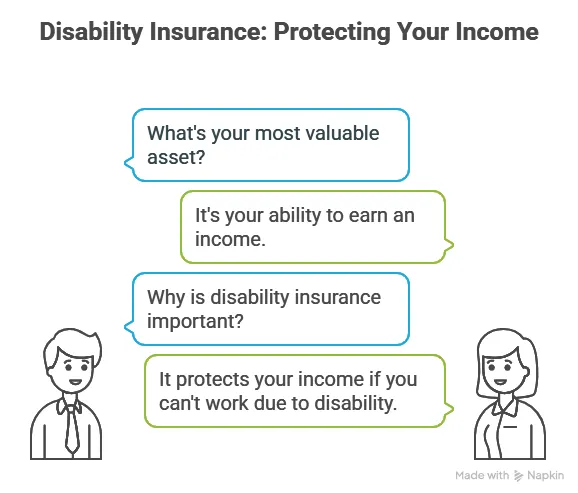
Your Most Valuable Asset: Why You Might Be Overlooking Disability Insurance
If I asked you to name your most valuable financial asset, what would you say? For many people, the first things that come to mind are their home or their investment portfolio—the 401(k) they’ve worked so hard to build. And while those are incredibly important, for most of us still working, especially in our peak earning years, our most valuable asset is something we often take for granted: our ability to earn an income.
Think about it. Your income is the engine that powers your entire financial life. It funds your retirement savings, pays for your home, and allows you to live your desired lifestyle. Now, imagine if that engine suddenly shut down. A long-term disability can have a devastating impact on your financial security, potentially derailing decades of careful planning. That's why today, I want to talk about a critical piece of protection that is too often overlooked: disability insurance.
The Real Risk of Disability
We often think, "it won't happen to me," but the statistics might surprise you. A 2021 review by the Council for Disability Awareness found that a healthy 35-year-old has about a one-in-four chance of experiencing a disability before they reach retirement age. That’s a significant risk. For those of us in the retirement red zone—those final 5 to 10 years of work—a disability can be especially catastrophic. These are often your highest-earning years, the time when you're making the biggest contributions to your nest egg. Losing that income stream can fundamentally alter your retirement picture.
Understanding the Fine Print: "Own-Occupation" vs. "Any-Occupation"
When it comes to disability insurance, not all policies are created equal. The language in the policy makes a huge difference in how, and if, it will pay out. Two key terms you need to understand are "own-occupation" and "any-occupation."
Own-Occupation: This is generally the most favorable type of policy for you. It defines disability as being unable to perform the specific duties of your own job. For example, if a surgeon injures their hand and can no longer perform surgery, an own-occupation policy would likely pay benefits, even if they could still work as a consultant or a professor. These policies are more likely to pay out but also tend to have higher premiums.
Any-Occupation: This type of policy is more restrictive. It typically only pays benefits if you are unable to perform the duties of any occupation for which you are reasonably qualified based on your education, training, or experience. Using the same example, the insurance company might argue the surgeon could still work in a different capacity, and therefore deny the claim.
Understanding this distinction is absolutely critical when evaluating whether a policy truly meets your needs.
Why Your Employer's Coverage Might Not Be Enough
"But Ric," you might be thinking, "I have disability coverage through my job." That’s a great start, but in my experience, employer-provided group disability insurance often has significant gaps, especially for higher earners. Here are a few reasons why you shouldn't rely on it alone:
Benefits are Taxable: If your employer pays the premiums for your group policy (which is almost always the case), any disability benefits you receive will be considered taxable income. This can dramatically reduce the amount of money you actually take home, right when you need it most.
Coverage is Often Limited to Salary: Many group plans base their coverage solely on your base salary, completely ignoring bonuses, commissions, or other forms of compensation that might make up a large part of your total income.
There's Usually a Cap: Group policies almost always have a monthly benefit cap. This cap could be much lower than the standard 60% of salary that is often advertised. For high-income professionals, this cap might leave a massive shortfall between your disability benefit and your actual living expenses.
These limitations often make it necessary to explore a private, individual disability policy to properly protect your income.
How a Financial Advisor Can Help
Navigating the world of disability insurance can be complex, but you don't have to do it alone. This is an area where I can provide significant value. My role is to help you:
Highlight the Need: First and foremost, I can help you see the potential financial impact a disability could have on your specific retirement goals.
Evaluate the Tradeoffs: We can look at the cost versus the benefit of different policies, helping you find a solution that fits your budget while providing robust protection.
Analyze the Details: I can help you dig into the fine print of a policy—the definitions, the waiting periods, the benefit amounts—to ensure it truly aligns with your occupation and financial situation.
Determine the Right Amount: We can work together to calculate the appropriate amount of coverage you need to maintain your lifestyle and keep your retirement plan on track should the unexpected happen.
Protecting your ability to earn an income is one of the most important steps you can take to secure your financial future. If you’re not sure about your current disability coverage, let’s make it a priority to review it together.
